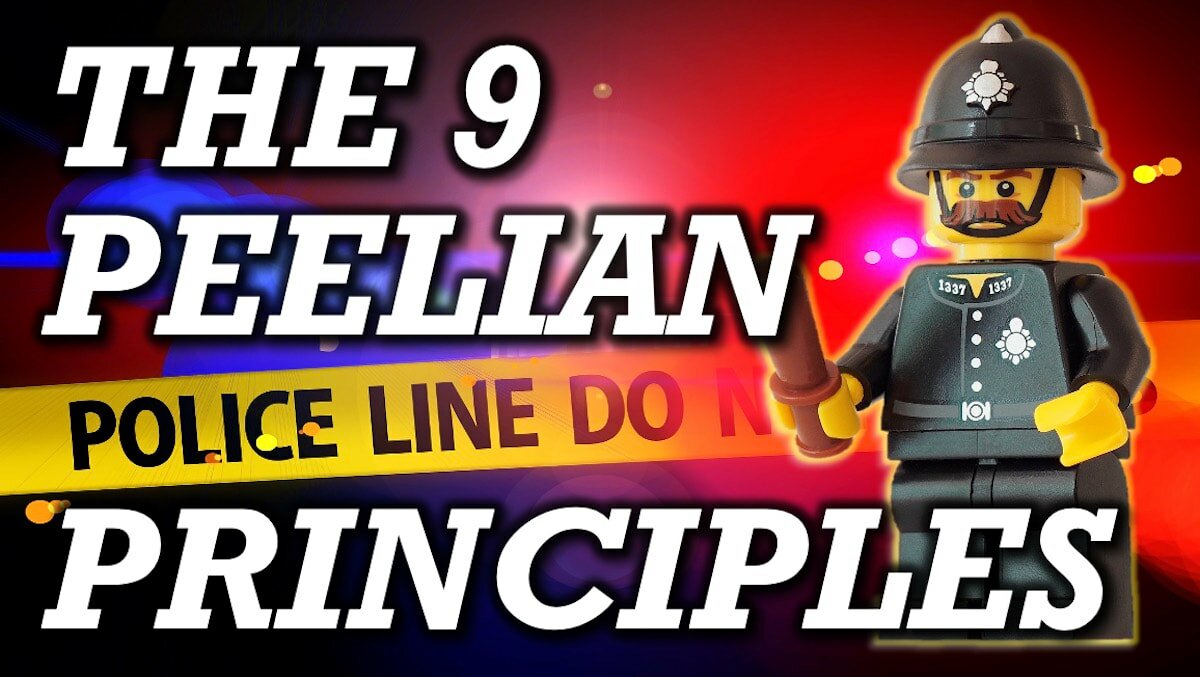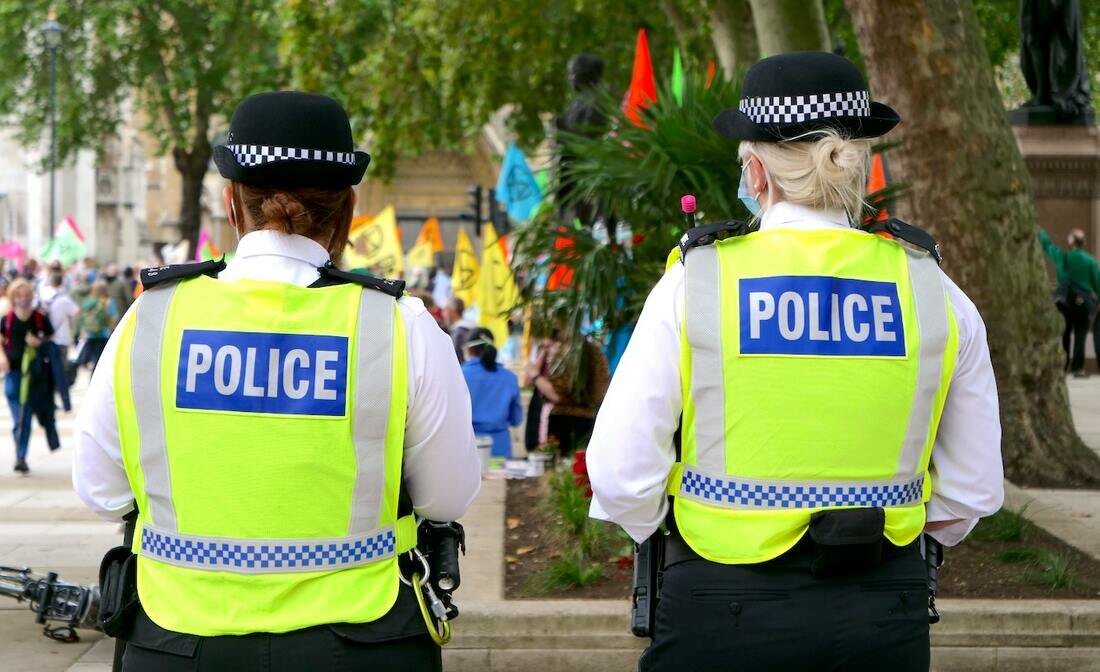|
“The police are the public and the public are the police.”
Peelian Principle
The ‘Peelian Principles’ were established nearly 200 years ago by Sir Robert Peel, who founded the Metropolitan Police Service. These nine principles are considered the bedrock of our ‘policing by consent’ model of policing relied upon in the UK, even forming part of the PEEL inspections for forces.
When researching information about your force in preparing to join the police, it is helpful to understand a little about this history, since much of today’s policing values, goals, oaths, and ultimate legitimacy among the public derives from these ethical foundations of the UK’s first professionalised police force. What Are the 9 Peelian Principles for Policing?
“Ready offering of individual sacrifice in protecting and preserving life.”
Peelian Principle
Let’s get straight into the nine Peelian Principles, where you’ll hopefully recognise their timeless nature and relevance to well-publicised issues surrounding policing today. I’ve highlighted some key points and phrases to prompt your thinking:
1. To prevent crime and disorder, as an alternative to their repression by military force and severity of legal punishment.
2. To recognise always that the power of the police to fulfill their functions and duties is dependent on public approval of their existence, actions and behaviour, and on their ability to secure and maintain public respect. 3. To recognise always that to secure and maintain the respect and approval of the public means also the securing of the willing co-operation of the public in the task of securing observance of laws. 4. To recognise always that the extent to which the co-operation of the public can be secured diminishes proportionately the necessity of the use of physical force and compulsion for achieving police objectives. 5. To seek and preserve public favour, not by pandering to public opinion, but by constantly demonstrating absolutely impartial service to law, in complete independence of policy, and without regard to the justice or injustice of the substance of individual laws, by ready offering of individual service and friendship to all members of the public without regard to their wealth or social standing, by ready exercise of courtesy and friendly good humour, and by ready offering of individual sacrifice in protecting and preserving life. 6. To use physical force only when the exercise of persuasion, advice and warning is found to be insufficient to obtain public co-operation to an extent necessary to secure observance of law or to restore order, and to use only the minimum degree of physical force which is necessary on any particular occasion for achieving a police objective. 7. To maintain at all times a relationship with the public that gives reality to the historic tradition that the police are the public and that the public are the police, the police being only members of the public who are paid to give full-time attention to duties which are incumbent on every citizen in the interests of community welfare and existence. 8. To recognise always the need for strict adherence to police-executive functions, and to refrain from even seeming to usurp the powers of the judiciary of avenging individuals or the State, and of authoritatively judging guilt and punishing the guilty. 9. To recognise always that the test of police efficiency is the absence of crime and disorder, and not the visible evidence of police action in dealing with them. How Are the Peelian Principles Relevant to Policing Today?
“The power of police to fulfil their functions and duties is dependent on public approval of their existence, actions, and behaviour.”
Peelian Principle
These Principles are powerful and timeless in their relevance to policing. Consider for example how officers respond bravely to all kinds of incidents, up to and including terrorism attacks such as around London Bridge just a few years ago. Then read again the Principle that inspires such bravery, 'the ready offering of individual sacrifice in protecting and preserving life'.
Here are some more examples how these founding principles play out in modern policing: CVF Values You will be assessed on your values when seeking to join the police. The national Competency and Values Framework (CVF) defines the core policing values as: Public Service, Integrity, Impartiality and Transparency. Some forces have their own bespoke CVF values, for example Police Scotland and the Metropolitan Police. Knowing the Peelian Principles can help put meaning toward these sometimes-abstract words. This will help you better explain in your own authentic way when, how and why you have demonstrated these behaviours, for example in an interview scenario. Oath and attestation When you successfully pass your application, inte rview, and other assessments, you will swear an oath (aka ‘attestation’) when you become a Police Constable. Below are the oaths sworn by officers in England & Wales (and other UK territorial police forces such as British Transport Police and MoD Police), Police Scotland, and PSNI. They differ slightly, but the values and principles are seen throughout. Read this document on the office of constable for further principles relevant to police officers today. England & Wales oath: “I do solemnly and sincerely declare and affirm that I will well and truly serve the Queen in the office of constable, with fairness, integrity, diligence and impartiality, upholding fundamental human rights and according equal respect to all people; and that I will, to the best of my power, cause the peace to be kept and preserved and prevent all offences against people and property; and that while I continue to hold the said office I will to the best of my skill and knowledge discharge all the duties thereof faithfully according to law.” Police Scotland oath: “I do solemnly, sincerely and truly declare and affirm that I will faithfully discharge the duties of the office of constable with fairness, integrity, diligence and impartiality, and that I will uphold fundamental human rights and accord equal respect to all people, according to law.” Police Service of Northern Ireland oath: “I hereby do solemnly and sincerely and truly declare and affirm that I will faithfully discharge the duties of the office of constable, with fairness, integrity, diligence and impartiality, upholding fundamental human rights and according equal respect to all individuals and their traditions and beliefs; and that while I continue to hold the said office I will to the best of my skill and knowledge discharge all the duties thereof according to law.” Performance and measures of success It might be argued that policing would do well to revisit Principle 9 in context of objective-setting and performance goals! Legitimacy Legitimacy of centralised, professional (paid full-time) policing has been an issue from the founding of the Met Police and persists to this day. Although originating among suspicions police might devolve into a French model of more militaristic policing 200 years ago, today’s issues of legitimacy are different. They include for example: whether policing is representative and inclusive of the communities it serves (particularly increasing diversity to account for changing demographics); whether response to various protests is proportionate and impartial to the cause (be it Black Lives Matter, Extinction Rebellion, Anti-Vaccine Passports, or more recently Insulate Britain); police use of force, particularly in an age where officer actions are broadcast on social media in minutes; proportionality of stop and search, particularly the police’s ability to then engage with Black and Minority Ethnic communities. Professional standards of behaviour Police officers are expected to uphold much higher standards of behaviour than the general public, because otherwise what consent from the public can be gained when the police must impartially uphold law and order? When it goes wrong, this has a detrimental effect on public confidence and gets well-publicised across the media. For example, the facts of the Sarah Everard case and increasing reports of sexual misconduct and misogyny from male officers will have severely dented trust and confidence in the police from women. The knock-on effects of this can be dire (be it reduced confidence in reporting sexual assault and other crimes or general reduced cooperation with investigations). Officers are held to much higher standards to the extent that underpaying for Jaffa Cakes from your station tuck shop or exaggerating your qualifications can get you sacked and barred from policing. Therefore, it is imperative to conduct yourself to these high standards throughout the recruitment and assessment process, from being honest on your application form to acting professionally in assessment centres. Code of Ethics The police Code of Ethics (COE) defines how policing expects all police officers and staff to behave. It is essential reading and expands further on expected standards of behaviour, including honesty and integrity. It will help add insight and meaning to the CVF values. The COE will also help prompt ideas of when you have demonstrated such behaviours in the past, or how you would do so in future-based questions / scenarios.
“Integrity is doing the right thing, even when no-one is watching.”
C.S. Lewis
Force PEEL inspection frameworks
The Peelian Principles even underpin how most UK police forces are inspected and assessed by Her Majesty’s Inspectorate of Constabulary and Fire & Rescue Services (HMICFRS, or colloquially in policing, HMIC). PEEL stands for Police Effectiveness, Efficiency, and Legitimacy. Here’s an example summary of Merseyside’s latest PEEL Assessment and the sorts of things assessed. I provide more on my Rank Success YouTube channel supporting serving police officers with leadership CPD and promotion – much of which is also relevant to those seeking to join the police! Where else can you envisage these Peelian Principles apply in policing today? I hope you found this blog helpful and useful food for thought. For complete guidance on joining the police and navigating the assessment process, please download my ‘8 Steps to Success’ eGuide. Even better, use promo code JOINTHEPOLICE for a whopping 50% off at checkout. I wish you every success on your journey! Kind Regards, Steve
I hope you found this blog helpful, whether you are an aspiring to join the police as a member of the public, leaving the military, a serving Special Constable or PCSO. Download the comprehensive Police Success guide (below) for more detailed guidance, or feel free to arrange some 1-2-1 coaching for bespoke support. The guide includes comprehensive information about the role, CVF, assessment tests, application interviews, practice questions, and much more to help you excel and achieve your ambition to joining the police!
0 Comments
Leave a Reply. |
 RSS Feed RSS Feed
AuthorA former Royal Marine, Detective Inspector, and is a qualified coach/mentor. With extensive police experience, Steve also established Rank Success to help officers achieve police promotion. CategoriesAll ArchivesFebruary 2021 |





